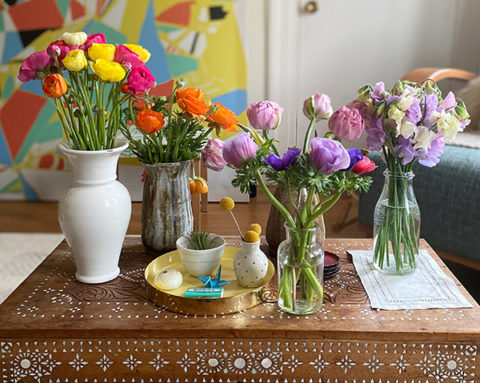
A reporter recently asked her Twitter followers how they’ve been able to convince their Boomer parents to take COVID-19 seriously. I responded that I didn’t need to; when she was very young, my mom had had to flee into the Philippine jungle with her family during the Japanese occupation of the Philippines (which, okay, makes her just a couple years too old to be a Boomer), and then she left the Philippines in the 70s, when Marcos declared martial law in the country. Early trauma imprinted on her the need to always be prepared for disaster. With refrigerators (yes, plural) full of food, and a garage stocked with every toiletry she and my dad (who *is* a Boomer) will need for the next year, my mom has been preparing for this her entire life.
I, however, am the opposite. I only buy enough groceries to last me a week. I replace toiletries right before they run out (or, um, sometimes after). I have lived my entire life taking it for granted that I’ll be able to find what I need when I need it. And that, I’m realizing now, is a huge privilege.
When I hear reports of Americans lining up outside Costco, or hoarding supplies, I get it. Many of us have just assumed that we’ll always be able to get what we want when we want it, that our systems will work for us in the event of a crisis. The US is a rich, developed country; we’ll be okay, right? But the response to this pandemic has shown us just how frail our system is. As one of my Filipina cousins who now lives in Belgium remarked last week, it’s becoming clear to the rest of the world that the US actually has the safety net of a developing country. The affluent will likely be able to weather the storm. It’s the many who live on the edge, with no financial cushion, limited access to paid sick leave, and poor or no health insurance who will suffer – indeed, who are already suffering.
I’ve been reflecting on this a lot, as I think about my own family history of migration (from the American South) and immigration (from Southeast Asia). Many Americans believe that what’s happening here now are things that happen in “other” places, to “other” people. But as it becomes clear that that the US is one of those “other” places, and we are those “other” people, I hope we can find a way to have empathy for each other, both locally and globally. This means empathy for the refugees and immigrants who are fleeing the places where things have long been worse than they are here. This means empathy for hourly wage earners and tipped employees whose financial well-being is precarious as businesses close. This means empathy for the homeless who have few ways to manage their health, let alone their shelter. This means empathy for the poor, who are already just barely making ends meet with very low wages and few services. This means empathy for the people who still have to report into offices, stores, and restaurants, as well as empathy for the owners of those businesses who continue to have to make daily, difficult decisions about whether or not to stay open or to close. We are all in this together. Not all of us will make it through this – my grandfather didn’t survive WWII, and there are countless people who will die from this virus – but I hope that we’ll all seize on this opportunity to evaluate how we view our roles as citizens of the world, and then act.
